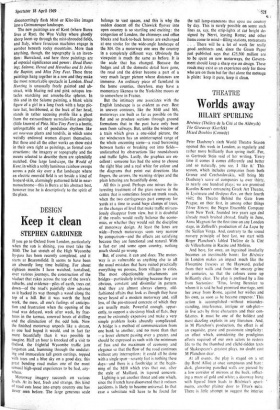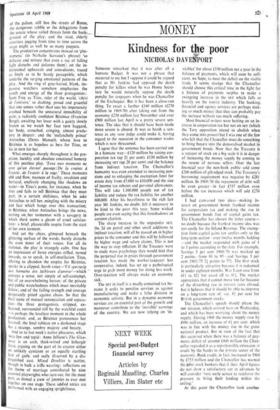THEATRE
Worlds away
HILARY SPURLING
Berenice (Theatre de la Cite at the Aldwych) The Giveaway (Garlick) Mixed Doubles (Comedy) Peter Daubeny's sixth World Theatre Season opened this week in London, as regularly and rather more brilliantly than spring itself. For, as Gertrude Stein said of her writing, 'Every time it comes it comes differently and better and so naturally, you see, I like it.' This season, which includes companies from both Greece and Czechoslovakia, will bring Mr Daubeny's score of companies to over thirty, in nearly one hundred plays; we are promised Karolos Koun's entrancing Greek Art Theatre, in' Lysistrata and Oedipus Rex. on their fourth visit; the Theatre Behind the Gate from Prague, on their first, in among other things Three Sisters; the Negro Ensemble Company from New York, founded two years ago it'd already much bruited abroad; finally in June, Anna Magnani for the first time on any London stage, in Zeffirelli's production of La Lupa by the Sicilian Verga. And, contrary to the sound nursery principle of best last, we start with Roger Planchon's fabled Theatre de la Cite de Villeurbanne in Racine and Moliere.
And here, for once, an ingrained insularity becomes an inestimable boon: for Berenice in London makes an impact much like the Florentine frescoes at the Hayward, peeled from their walls and from the smeary grime of centuries, so that the colours come up brilliantly clear. The play is prefixed by a line from Suetonius: `Titus, loving Berenice to whom it is said he had promised marriage, sent her away from Rome, against her wishes and his own, as soon as he became emperor.' This action is accomplished—without misunder- standing, interference, intrigue or sub-plot- in five acts by three characters and their con- fidantes. It must be one of the boldest and most dazzling exploits in any literature. And, in M Planchon's production, the effect is of an exquisite, grave and passionate simplicity : an effect which, considering the prodigious efforts required of our own actors to restore life to the the thumbed and cliche-ridden texts of Shakespeare's greatest plays, no doubt cost M Planchon dear.
At all events, the play is staged on a set (by Rene Allio) at once sumptuous and bare : dark, glowering panelled walls are pierced by a low corridor of mirrors at the back, reflect- ing a maze of gold and white; a doorway hung with figured linen leads to Berenice's apart- another plainer door to Titus's suite. There is little attempt to suggest the interior
of the palace, still less the streets of Rome, the dangerous rabble or the delegations from the senate ,whose veiled threats form the bulk_ ground of the play; and the staid, elderly courtiers jogging from time to time across the stage might as well be so many puppets.
The production concentrates instead on 'phe- nomena' (in Nathalie Sarraute's phrase) 'so delicate and minute that even a ray of falling light disturbs and deforms them'; on the in- finitesimal upheavals and convulsions, traced so finely as to be barely perceptible, which underlie the surging emotional patterns of the play. And the ring of grey-haired, blank, im-
passive watchers somehow emphasises the youth and energy of the three protagonists: Sami Frey as Titus, ruler of the world, `cheri de l'univers,' so dashing, proud and graceful that one senses rather thari sees his impetuosity
crushed beneath the unnatural immobility of pain; a radiantly confident Berenice (Francine Berge), awaiting her lover with a gaiety slowly frozen as we watch her face turn haggard, her body, crouched, cringing, almost preda- tory in despair; and the 'melancholy prince'
Antiochus (Denis Manuel), whose love to Berenice is as hopeless as hers for Titus, or his in turn for her.
What emerges sharply throughout is the pre- cision, lucidity and absolute emotional honesty of this peerless play. 'Tons rues moments ne sons qu'un &erne! passage De la crainte !'espoir, de I'espoir a la rage.' These moments ebb and flow, nuances of frailty, revulsion and
betrayal, endlessly changing like shadows on water—in Titus's panic, for instance, when he tries and fails to tell Berenice that they must part; in a certain shiftiness, when he asks Antiochus to tell her, mingling with the misery and fear which hangs over this transaction;
in Berenice, when Antiochus brings the news, turning on4her tormentor with a savagery in which there seems a gleam of cruel satisfac- tion: a brief, pleasurable respite from the start of her own torment.
And yet the abyss, glimpsed beneath the glittering surface of the words, barely disturbs
the even tenor• of their voices. For all its
violence, the play is strangely calm. One has an impression of fierce energies stifled, turned
inwards, so to speak, in self-mutilation. Titus, offering to abandon the empire for Berenice, speaks in a clipped, harsh voice—'Vil spectaclg aux humains des faiblesses d'amour'—which —
conveys a sense, not simply of self-contempt, but of an overwhelming horror; of the private and public wretchedness which must inevitably follow; and of the failing strength and courage desperately pitted against chaos. So that the final scene of mutual renunciation and separa- tion—the three protagonists, stripped, ex- hausted, surrounded still by the watchful court —is perhaps the loveliest moment in the whole production; and, as Berenice pronounces her farewell, the final tableau on a darkened stage has a strange, sombre majesty and beauty.
And so to last week's native pleasures, which Were few and tepid : Anne Jellicoe's The Give- away is an arch, thick-wined and lethargic farce, arguing on the part of its creator either, an unlikely cynicism or an equally startling lack of guile, and sadly ill-served by a dis- tinguished cast. Mixed Doubles is nattier, though in bulk a trifle wearing: reflections on the theme of marriage contributed by nine assorted playwrights who turn out, for the most part, as dismal a crew of jimmies as ever met together on one stage. These addled antics are performed with an engaging sprightliness.











































 Previous page
Previous page